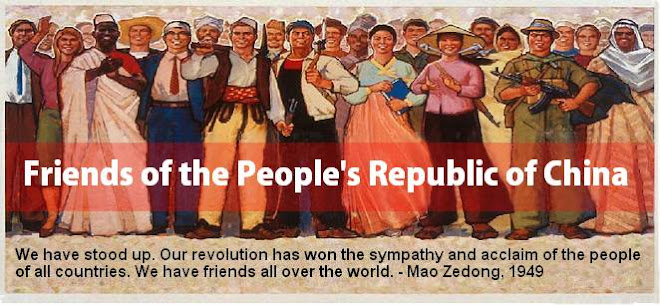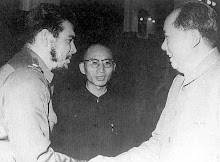
Chomsky: "What is challenging the US
is not China’s development, but its independence."
Global Voices Online
On 13 August, Noam Chomsky delivered a speech at the Peking University in Beijing. Chomsky, one of the leading public intellectuals of our age, is famous for his political activism and contributions to linguistic and philosophy. The talk, titled Contours of World Order: Continuities and Changes, was mostly about two dominant threats facing humanity: nuclear wars and environmental degradation.
While Chomsky has re-emphasized his criticisms on the United States, he has also expressed his opinions on China. In Chomsky’s view, emerging countries like China and India still have a long way to go to challenge the America. Of particular concern is the environmental cost of China’s development model, and the many internal and social problems that China has to tackle. This week, the Southern Metropolitan Daily publishes an interview with Chomsky. An excerpt of the interview is translated below.
SMD: Most Chinese have accepted globalization. In the past three decades, especially after China joined the World Trade Organization (WTO), many Chinese have benefited tremendously. But it seems that you see globalization in poor lights.
Chomsky: China’s economic achievement has little to do with globalization. It is related to trade and export. China has gradually become an export-oriented country. No one, myself included, is opposed to exports. But this is not globalization. In fact, China has become a factory in the Northeast Asian production system. If you look at the whole region, you will find it very dynamic. China’s export volume is enormous. But there is something we have overlooked. China’s export relies heavily on the exports of Japan, Korea and the US. These countries provide China with high-tech components and technologies. China is just doing the assembly, and labelling the final products as ‘Made in China.’
China has developed rapidly by following wise policies. But while millions of people were lifted out of poverty, costs such as environmental degradation are high. They are merely transferred to the next generation. Economists will not worry about them, but these are costs that someone needs to pay for ultimately. It may be your children or grandchildren. These have nothing to do with globalization and the WTO.
SMD: Do you think the rise of China will change the world order? Will China play the role that the US is playing now?
Chomsky: I don’t think so; neither do I hope so. Do you really hope to see a China with 800 overseas military bases, invading and overthrowing other governments, or committing terrorist acts? This is what the America is doing now. I think this will not, and cannot, happen on China. I do not wish it to happen neither. China is already changing the world. China and India together account for almost half of the world’s population. They are growing and developing. But relatively speaking, their wealth is only a small part of the world. Both countries still have long ways to go and face very serious domestic problems, which I hope will gradually be solved. It is meaningless to compare their global influences with those of rich countries. My hope is that they will exert some positive influences to the world, but this has to be watched carefully.
China should ask itself what role it wishes to take in the world. Fortunately, China is not assuming the role of an aggressor with a large military budget, etc. But China does have a role to play. It is am enormous consumer of resources, and there are pros and cons. For example, Brazil will benefit economically if it exports to China. On the other hand, its economy will also be damaged. For countries with abundant resources like Brazil and Peru, one problem is their reliance on exports of primary resources, which is not a good development model. To change their mode of development, they first need to solve their domestic problems and transform themselves into producers, not just exporting primary products to other producer countries.
SMD: Is the success of China a challenge to Western democracies?
Chomsky: Let’s make a historical comparison. Was the rise of the United States a threat to democratic Britain? The United States was founded on the slaughtering of indigenous population and the slave system. Is this model suitable for other countries? Do you want China to learn from this model? It is true that the US has developed into a democratic country which is strong in many respects, but its democracy is not developed from this model, which any rational person would not want to imitate.
China is developing, but there is no evidence to prove that its internal development is causing a threat to the West. What is challenging the US is not China’s development, but its independence. That is the real challenge.
You can tell from every day’s headlines that the current focus of US foreign policy is Iran. The year 2010 is called ‘The Year of Iran.’ Iran is portrayed as a threat to US foreign policy and the world order. The US has imposed harsh, unilateral sanctions, but China has not followed suit. China has never followed the US lead. Instead, it supports UN sanctions, which are too weak to matter. A few days before I left for China, the US States Department warned China in a very interesting way. It said China has to bear international responsibilities, i.e. follow US orders. This is China’s international responsibilities.
This is standard imperialism, which is that other countries have to act according to our requests. If not, they are irresponsible. I think officials from the Chinese Foreign Ministry must laugh when they hear this. But this is the standard logic of imperialism. In fact, Iran becomes a threat because it does not follow US instructions. China is a bigger threat, as it is a big problem when a major power refuses to obey orders. This is the challenge that the US faces.




No comments:
Post a Comment